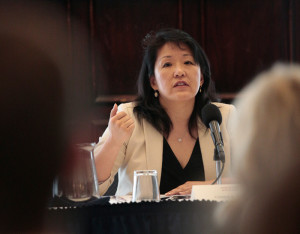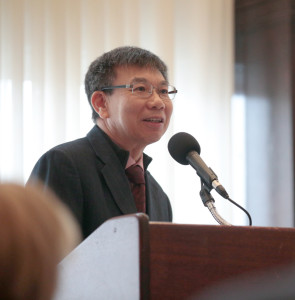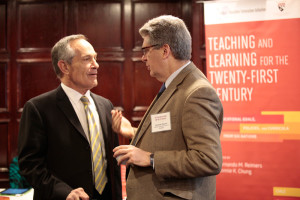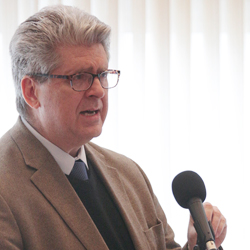Harvard scholars decode “DNA” of 21st century global education in new book
By Jillian SlutzkerApril 12, 2016
Click here to watch the Spanish language Voice of America report.
A new six-country study from scholars at the Harvard Global Education Innovation Initiative aims to decode the keys to preparing today’s students for success beyond the basics, including civic, digital and interpersonal competencies.
“We are the genome project of education for the 21st century,” said Fernando M. Reimers, Co-Editor of Teaching and Learning for the Twenty-First Century: Educational Goals, Policies, and Curricula from Six Nations (Harvard Education Press, 2016), speaking at the book launch, which was hosted by Creative Associates International on April 11 in Washington, D.C.
Education has become the “critical component” for reaching shared global goals, said Charito Kruvant, CEO and Co-Founder of Creative, introducing the book and praising the “richness” of its findings.

In an increasingly interconnected world, the competencies young people need to succeed in modern economic, social and political contexts are evolving, but there is a gap between these aspirations and what schools actually do, said Reimers.
“Why is it that we have built these institutions that we call schools and what is it that they should be doing in the 21st century?” posed Reimers.
By examining curricula, policies and practices in Chile, China, India, Mexico, Singapore and the United States, the book’s authors aim to break down the “DNA” of educational experiences that are effectively closing this gap and creating empowered, innovative thinkers.
“The time is right for [these examples] not to just be an isolated teacher, but to make it systemic,” said Connie K. Chung, Co-Editor of the book and Research Program Director at Harvard’s Global Education Innovation Initiative.
To read the editors’ blog, “What students really need to thrive in the 21st century,” click here. The book may be ordered here.

Education as nation building
The research findings of the book have implications beyond the classroom alone, said its contributors. Education systems lay the foundations for a nation’s social and economic life.
“Teaching is unlike any other profession because it is truly about nation building,” said Ee Ling Low, book contributor and Director of the Office of Strategic Planning and Academic Quality at the Nanyang Technological University’s National Institute of Education in Singapore—a country that has gone from “mudflats to metropolis” in 50 years in large part due to a strategic national education effort.
Capturing this big picture perspective and bringing in a broad, diverse set of stakeholders into this education discussion is a key goal of the study.
“It is very very easy to be caught in this narrow, siloed perspective of what we do in our curriculum…..but schools cannot work alone,” said Oon Seng Tan, book contributor and Director of the Singapore’s National Institute of Education. “The problems of learning are not just part of the schools, they are problems in the community.”
Tan says the next crucial step is translating these lessons learned into practical tools and policies for implementation.
Innovation & collaboration, a true transnational endeavor

Despite unique geopolitical and economic contexts, all countries across the GDP spectrum share the challenge of preparing youth to become competent national and global citizens, explained panelists. Goods, ideas and people are constantly crossing borders.
“We must address this issue from the standpoint of globalization and transnational approaches to answering this question,” said panelist Alan Bersin, Assistant Secretary for International Affairs at the U.S. Department of Homeland Security and former California Secretary of Education. He spoke in his personal capacity, not as a representative of the U.S. government.
Bersin urged that just as heads of state, foreign affairs ministers and other leaders regularly convene on the international stage, so too should education ministers meet to share strategies and approaches to addressing current education challenges.
Scaling up educational approaches that foster innovative and creative thinkers will also be key to overcoming shared transnational challenges, said panelists. Today’s youth will be the responsible for addressing future challenges, which have not yet emerged, and filling tomorrow’s jobs, which have not yet been created.
Panelist Joe Fatheree, President of the Teacher of the Year Organization, said preparing students for the 21st century means equipping systems and educators with the right tools and training “so students can jump out and are fearless as they approach innovation and creativity.”
Click here to watch the Spanish language Voice of America report.


